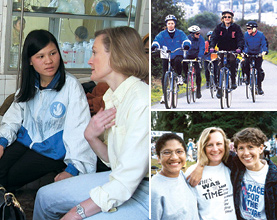Dec 20, 2012
Dr. Julie Gralow empowers patients with breast cancer at home and around the world
 |
|
|
Dr. Gralow’s volunteer service has taken her around the world. She consults with a patient with breast cancer while visiting a medical school in Thai Nguyen, Vietnam (left) |
When she isn’t at work, Julie Gralow, MD, of the University of Washington and Seattle Cancer Care Alliance, enjoys exercising, being outdoors, and seeing the world. Through her extensive volunteer service in the United States, the Ukraine, and Uganda, among other places, she has found a way to dovetail her professional and personal interests while serving as an advocate for women with breast cancer.
AC: How did your involvement with charity triathlons and other races, and your affiliation with Team Survivor, begin?
Dr. Gralow: When I began my junior faculty position, I was interested in finding a way to help my patients incorporate physical activity into their therapy, recovery, and survivorship, as I observed that patients who were active bounced back faster. A triathlon was being held in Seattle, and along with a radiation oncologist at my institution, we nominated a group of patients to participate. We trained together for several months, and I did the triathlon along with them. When we reached the finish line, everyone said, “What next?” We wanted to create a program that would be available year-round for women of any activity level. Team Survivor is a national nonprofit organization that helps organize group exercise opportunities for women affected by cancer. We created the Team Survivor Northwest affiliate in 1995, and it’s been going strong for 17 years.
AC: What led you from triathlons to volunteering in the Ukraine?
Dr. Gralow: In 1997, I served as the medical oncologist advisor to a group in Seattle called PATH (the Program for Appropriate Technology in Health) in its application for USAID funding for a breast cancer project in the Ukraine. PATH had a strong network already set up in the Ukraine related to their vaccine work. They received the funding, and between 1997 and 2000, we participated in the Ukraine Breast Cancer Assistance Project, along with the Ukrainian government. I took a lot of trips to the former Soviet Union during that period. A really important and unexpected outcome was related to work on the psychosocial aspects of breast cancer in the Ukraine—specifically, the conversations that were happening between health care providers and patients, and the provision of patient-to-patient support. At that time, there was really nothing going on in this area, but by 2001—thanks in large part to the volunteers on this project—there were breast cancer support groups sprouting up all over the Ukraine, and the first March for Life and Hope was held in Kiev.
I wanted to find a way to encourage and support this work, and committed to hold a series of breast cancer advocacy conferences that would bring together participants from the Ukraine and other former Soviet Union countries to talk about successes, barriers, and challenges in breast cancer communication across the region. In 2003, we held the first conference in Vilnius, Lithuania, and have held one every two years since. The group is now WECAN: the Women’s Empowerment Cancer Advocacy Network. In 2013, we’ll be holding our sixth WECAN Eastern European/Central Asian Conference in Tbilisi, Georgia.
AC: You’ve also volunteered extensively in Uganda.
Dr. Gralow: The Fred Hutchinson Cancer Research Center has a strong program in infection-related cancers in Uganda. It was set up as a true collaboration to train each other’s fellows, conduct research, and provide clinical care. As it became evident that the most common cancers in Ugandan women were breast and cervical cancer, I joined the project. Along with fellows from the breast clinic, I’ve made several visits to Uganda.
We now have the opportunity to take the WECAN model of support and advocacy training and try a modified version in Africa. We’ll have our first African WECAN conference in Rwanda, with strong support from the Ugandan breast cancer advocates, in fall 2013. I’ll be attending as a coordinator for the conference, with the East African Breast Cancer Initiative playing a strong role. Five or six countries are represented on the planning committee, and my group will help provide infrastructure and seek funding for travel and housing for the delegates. I’m really excited.
AC: What would you say to physicians interested in volunteering overseas?
Dr. Gralow: The time is ripe for those interested in global health in cancer, following the United Nations High-level Meeting on Non-Communicable Disease and the World Health Organization’s action plan and metrics in non-communicable diseases. The U.S. NCI has a Center for Global Health (see related article) and the Union for International Cancer Control provides opportunities around the world. In addition, ASCO offers a number of great opportunities. I’ve participated in the International Development and Education Award (IDEA) program as a mentor, in which early-career physicians from developing countries have the opportunity to attend an ASCO Annual Meeting and visit a mentor’s institution. ASCO has also partnered with Health Volunteers Overseas and organizes volunteer trips to several countries, where physicians are doing amazing work. More opportunities to volunteer are available than ever before.
Dr. Gralow is a Professor of Medical Oncology and the Jill Bennett Professor in Breast Cancer at the University of Washington School of Medicine and Director of Breast Medical Oncology at the Seattle Cancer Care Alliance. She has served on theCancer.Net Editorial Board and numerous ASCO committees and became a Fellow of ASCO in 2008.
